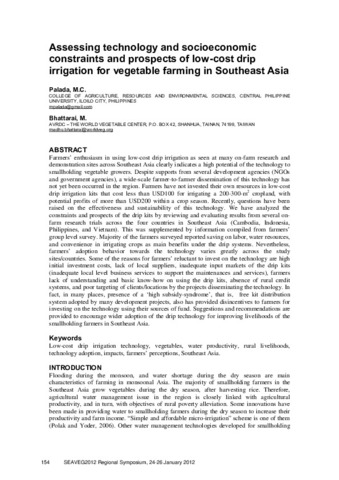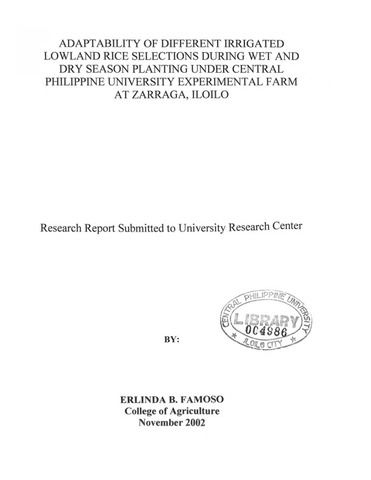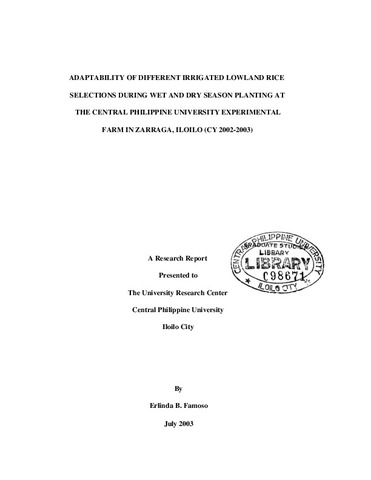Assessing technology and socioeconomic constraints and prospects of low-cost drip irrigation for vegetable farming in Southeast Asia
Abstract
Farmers’ enthusiasm in using low-cost drip irrigation as seen at many on-farm research and demonstration sites across Southeast Asia clearly indicates a high potential of the technology to smallholding vegetable growers. Despite supports from several development agencies (NGOs and government agencies), a wide-scale farmer-to-farmer dissemination of this technology has not yet been occurred in the region. Farmers have not invested their own resources in low-cost drip irrigation kits that cost less than USD100 for irrigating a 200-300-m2 cropland, with potential profits of more than USD200 within a crop season. Recently, questions have been raised on the effectiveness and sustainability of this technology. We have analyzed the constraints and prospects of the drip kits by reviewing and evaluating results from several on farm research trials across the four countries in Southeast Asia (Cambodia, Indonesia, Philippines, and Vietnam). This was supplemented by information compiled from farmers’ group level survey. Majority of the farmers surveyed reported saving on labor, water resources, and convenience in irrigating crops as main benefits under the drip systems. Nevertheless, farmers’ adoption behavior towards the technology varies greatly across the study sites/countries. Some of the reasons for farmers’ reluctant to invest on the technology are high initial investment costs, lack of local suppliers, inadequate input markets of the drip kits (inadequate local level business services to support the maintenances and services), farmers lack of understanding and basic know-how on using the drip kits, absence of rural credit systems, and poor targeting of clients/locations by the projects disseminating the technology. In fact, in many places, presence of a ‘high subsidy-syndrome’, that is, free kit distribution system adopted by many development projects, also has provided disincentives to farmers for investing on the technology using their sources of fund. Suggestions and recommendations are provided to encourage wider adoption of the drip technology for improving livelihoods of the smallholding farmers in Southeast Asia.
Description
Conference paper
Associated Content
Download full ProceedingsSuggested Citation
Palada, M. C. and Bhattarai, M. (2013). Assessing technology and socioeconomic constraints and prospects of low-cost drip irrigation for vegetable farming in Southeast Asia . In Holmer, R. , Linwattana, G. , Nath, P. , & Keatinge, J. D. H. (Eds.), Proceedings of the Regional Symposium on High Value Vegetables in Southeast Asia: Production, Supply and Demand (SEAVEG2012), 24-26 January 2012, Chiang Mai, Thailand (pp. 154-167). Tainan, Taiwan: AVRDC – The World Vegetable Center.
Type
Conference paperISBN
9290582006Subject(s)
Keywords
Series
AVRDC Publication;12-758Collections
- Conference papers [17]
The following license files are associated with this item:
Related items
Showing items related by title, author, creator and subject.
-
Field performance evaluation of the solar-powered irrigation project in Brgy. Hamungaya, Jaro, Iloilo City
Tenefrancia, Jayvee P. (2019)This study was conducted at the present location of the Project in Brgy. Hamungaya, Jaro, Iloilo from May to August 2018 evaluating the actual field performance of the Solar-Powered Irrigation Project The basic components ... -
Adaptability of different irrigated lowland rice selections during wet and dry season planting at CPU Zarraga experimental farm
Famoso, Erlinda B. (Central Philippine University, 2002-11)The studies were conducted from June 2001 to March 2002 at CPU Zarraga Experimental farm to determine the yield potential, range of adaptability and field reactions to major insect pests and diseases of promising rice ... -
Adaptability of different irrigated lowland rice selections during wet and dry season planting at the Central Philippine University experimental farm in Zarraga, Iloilo (CY 2002-2003)
Famoso, Erlinda B. (Central Philippine University, 2003-07)The studies were conducted from June 2002 to May 2003 at the CPU Zarraga experimental farm to determine the yield potentials and range of adaptability of promising rice selections and to identify those that could be ...






